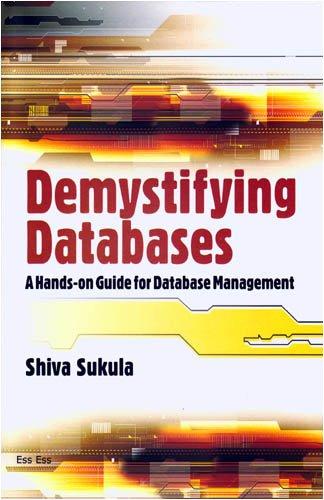Answered step by step
Verified Expert Solution
Question
1 Approved Answer
modify my code such that the truth table algorithm can work with the general knowledge base like for example this TELL ( a < =
modify my code such that the truth table algorithm can work with the general knowledge base like for example this
TELL
a c ~d & b & b a; c; ~f g;
ASK
~d & ~g ~f
import re
import itertools
# Function to replace logical operators
def replaceoperatorsexpr:
# Replace biconditional operators
expr resubrwssw r and or not and not expr
# Replace implications
expr resubrwssw rnot or expr
return expr
# Function to preprocess logical expressions
def preprocessexpressionexpr:
expr replaceoperatorsexpr
expr expr.replace~ not
expr expr.replace& and
expr expr.replace or
return expr
# Function to evaluate logical expressions
def evalexpressionpreprocessedexpr, truthassignment:
try:
# Ensure all variables are present in the truth assignment
for var in refindallrbwb preprocessedexpr:
if var not in truthassignment:
truthassignmentvar False
return evalpreprocessedexpr, builtins: None truthassignment
except Exception as e:
printfError evaluating expression preprocessedexpr: e
return False
# Function to parse propositions from the knowledge base and query separately
def parsepropositionsexpr:
return setrefindallrbwb expr
# Truth Table Enumeration algorithm
def ttentailskb alpha:
kbprops listparsepropositionskb
alphaprops listparsepropositionsalpha
allprops listsetkbprops alphaprops
printPropositions: allprops
return ttcheckallkb alpha, allprops,
def ttcheckallkb alpha, symbols, model:
if not symbols:
if pltruekb model:
return pltruealpha model
else:
return True
else:
p rest symbols symbols:
return ttcheckallkb alpha, rest, extendmodel p True and
ttcheckallkb alpha, rest, extendmodel p False
def extendmodel p value:
newmodel model.copy
newmodelp value
return newmodel
def pltruekb model:
clauses clausestrip for clause in kbsplit; if clause.strip
#printEvaluating KB with model:", model
for clause in clauses:
preprocessedclause preprocessexpressionclause
if not evalexpressionpreprocessedclause, model:
#printfClause clause is false in model model
return False
#printKB is true in model", model
return True
# Modified TT algorithm to count the models
def ttentailswithcountkb alpha:
kbprops listparsepropositionskb
alphaprops listparsepropositionsalpha
allprops listsetkbprops alphaprops
nummodels
numvalidmodels
for values in itertools.productTrue False repeatlenkbprops:
model dictzipkbprops, values
#printEvaluating model:", model
kbtrue pltruekb model
#printKB is "true" if kbtrue else "false", "for model:", model
if kbtrue:
nummodels
alphatrue evalexpressionpreprocessexpressionalpha model
#printQuery is "true" if alphatrue else "false", "for model:", model
if alphatrue:
numvalidmodels
#printfFinal count of valid models: numvalidmodels out of nummodels models evaluated."
return "YES" if numvalidmodels else NO numvalidmodels
# Forward Chaining algorithm using PLFCEntails pseudocode
def forwardchainingkb query:
clauses clausestrip for clause in kbsplit; if clause.strip
agenda
inferred
count
# Initialize agenda, inferred, and count
for clause in clauses:
if in clause:
premises, conclusion clause.split
premises premises.stripsplit&
conclusion conclusion.strip
countclause lenpremises
for p in premises:
if p not in inferred:
inferredp False
if p not in agenda:
agenda.appendp
if conclusion not in inferred:
inferredconclusion False
else:
if clause not in inferred:
inferredclause False
if clause not in agenda:
agenda.appendclause
# Process the agenda
while agenda:
p agenda.pop
if not inferredp:
inferredp True
for clause in clauses:
if p in clause and in clause:
premises, c
Step by Step Solution
There are 3 Steps involved in it
Step: 1

Get Instant Access to Expert-Tailored Solutions
See step-by-step solutions with expert insights and AI powered tools for academic success
Step: 2

Step: 3

Ace Your Homework with AI
Get the answers you need in no time with our AI-driven, step-by-step assistance
Get Started


